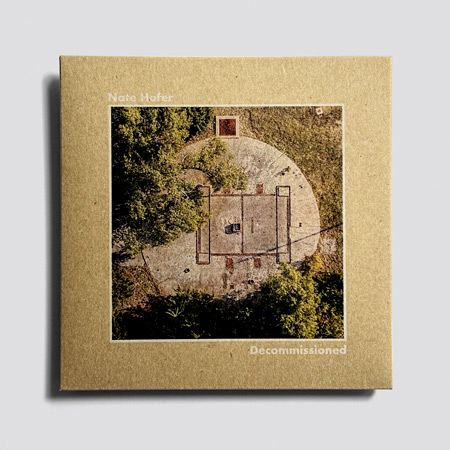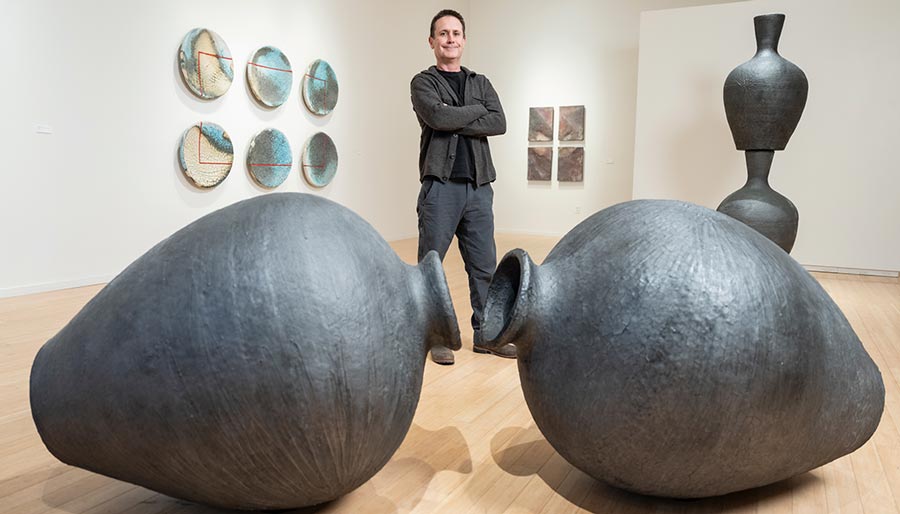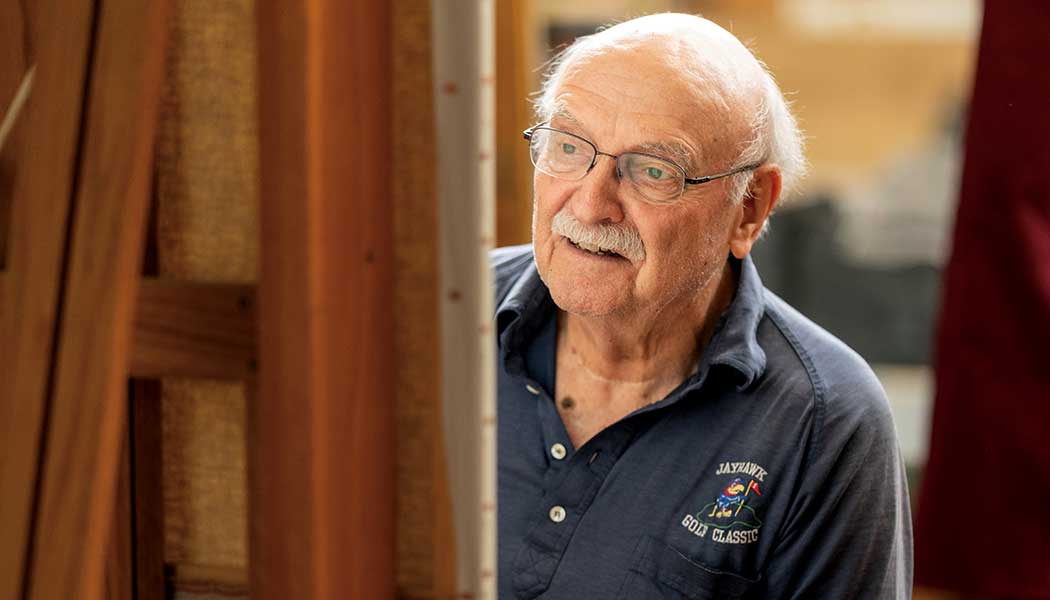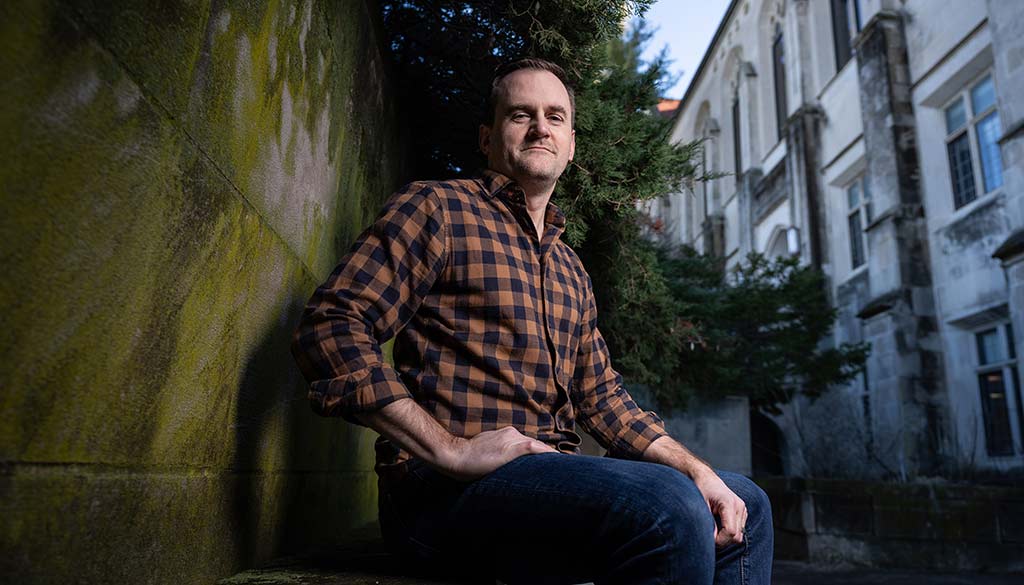From chills to chill: Artist records EP in decommissioned Kansas missile silo
Cold War sites that once caused anxiety are now source of inspiration, hope for photographer-musician.

As a kid coming of age at the tail end of the Cold War, Nate Hofer was aware of the rhetoric and sword-rattling between global superpowers that had played out on the world stage in the early 1980s. That much was evident with a glance at the backs of his grade-school assignment sheets, which he filled with sketches of battle scenes reminiscent of World War II combat with tanks, airplanes and infantry troops.
When he showed his drawings to his stepfather, seeking praise, he instead got straight talk about the realities of war.
“He was like, ‘Oh, I see what you’re doing,’” says Hofer, f’02, who majored in design/visual communication and painting. “‘This isn’t what war is. War is gross and messy and there’s a lot of killing. It’s not glamorous.’” The next war, his stepfather told him, would be fought with nuclear weapons, not guns and tanks. “He didn’t give me a lot of hope for what World War III would look like,” Hofer recalls, chuckling. “I appreciated that, but he also kind of put my first existential fear into my head, and I think I was probably a little too young to have that.”
That specter of nuclear war receded as the breakup of the Soviet Union unfolded, leading to arms-reduction treaties between U.S. and Soviet forces and spurring talk of a peace dividend. But by 2019, when Hofer earned a monthlong sabbatical from his job at the global creative digital agency VML, those threats had returned.
“The ‘fire and fury’ rhetoric was really heating up, and that brought back some of the old anxieties,” Hofer says. With more nations having nuclear weapons and with many of the old nonproliferation treaties now abandoned, “I hear the term ‘New Cold War’ with a chill,” he says now. “All the old feelings are back, but now the stakes are higher because I’m a husband, a father, with my eyes wide open.”
Hofer decided to focus his creative energies during the sabbatical on a project he’d been “sneaking up on” for a while: documenting some of the 150 decommissioned Minuteman Missile sites across Missouri. Using a camera attached to a drone, he took a series of aerial photographs that highlight the different ways these formerly identical sites evolved after the missiles were removed and the underground silos that housed them were filled in.
That project, “One and a Half Acres: Images from America’s Decommissioned Minuteman Missile Silos,” won a Global Peace Photo Award in 2021. Hofer traveled from his Overland Park home to Vienna, Austria, to collect the Alfred Fried Peace Medal.
“They look peaceful, these rectangular pieces of landscape in the American Midwest. Farming land, parking for scrapped cars, areas of wild growth, church square, forest, harvesting yard,” the prize citation reads. “But beneath them used to be hidden what could once have brought the death of millions: 450 launching platforms for intercontinental ballistic missiles, aimed at the Soviet Union.” Decommissioned after the signing of the START treaty in 1991, these plots “don’t just look peaceful … now they really are.”
But for Hofer, a longtime pedal steel guitarist who has performed, recorded and toured with Rex Hobart & the Misery Boys and other country and indie bands, interest in the topic didn’t stop there. “The photography came first, but being a musician I always envisioned there would be some kind of soundtrack for this,” he says. “I was thinking it would be pedal steel, but I wasn’t quite sure how that was going to work.”
Then he discovered an Airbnb listing for a former Atlas Missile site near Wilson, Kansas. The owner let him record in the empty launch chamber, which, unlike the destroyed Minuteman silos, was still intact.
Thus was born “Decommissioned,” a 22-minute, six-track EP of solo guitar music that Hofer described in an Aug. 2 TEDxKC presentation as “ambient pedal steel chill.” Recorded in 2021 and released this May, the evocative, ethereal music makes the most of the 150-foot-deep underground chamber’s unique echo, which creates a trippy sustained reverb that enhances the music’s ethereal feel. A device called an Ebow and an effects pedal that creates a repeating loop contribute further to the otherworldly vibe.
Like the photographs, the music—which Hofer describes as “the magnificent sound of what’s missing”—explores and celebrates what’s not there. Namely, nukes.
“The missile is obviously gone, thus there is this beautiful reverb chamber to make experimental sounds in,” he says.

The result is a collection of tunes in the tradition of ambient musician Brian Eno that makes the most of the steel guitar’s singular sonic capabilities and the unique recording environment. Fluid glissandos shimmer and cascade, and single notes ring clear and impossibly long, creating a haunting, eerie mood that is more soothing than alarming—a surprise, Hofer allows, to those expecting a gloomier tone from music made in a missile silo. “It’s experimental. It’s got lots of soft edges. It’s not really jarring,” he says. “It’s intentionally very chill or maybe even ignorable, but it puts you in a particular frame of mind.”
With two kids of his own who are near the same age he was when he learned of the world-ending power of nuclear weapons, Hofer these days tries to strike a more hopeful note. He sees abandoned missile sites not as grim totems of militarization, but as reminders of what’s possible when foes step back from the brink.
“I’m really trying to be as optimistic as possible. I want this ideally to communicate a mindset ultimately for arms negotiation, of being agreeable to diplomacy. I think that starts with being open-minded and in a good mood and optimistic.”
In other words, chill—not chilled.
Steven Hill is associate editor of Kansas Alumni magazine.
Photo by Frank Morris/NPR-KCUR
EP cover courtesy of Hammerpress
/




